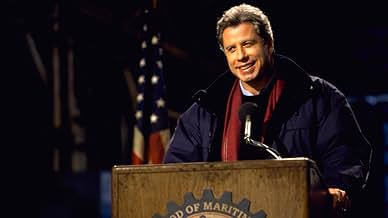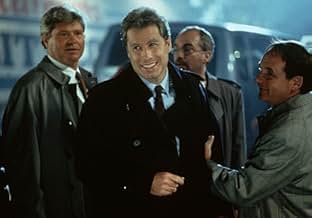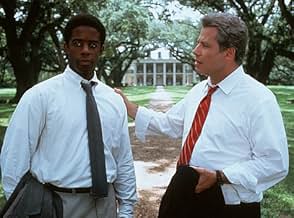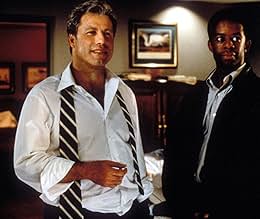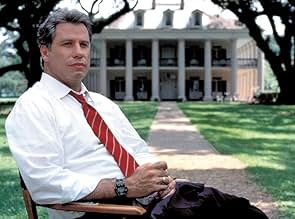A man joins the political campaign of a smooth-operator candidate for President of the United States of America.A man joins the political campaign of a smooth-operator candidate for President of the United States of America.A man joins the political campaign of a smooth-operator candidate for President of the United States of America.
- Nominated for 2 Oscars
- 10 wins & 31 nominations total
- Director
- Writers
- All cast & crew
- Production, box office & more at IMDbPro
Featured reviews
The much under-rated Primary Colors represents the zenith of its genre: a consistently excellent political satire armed with a stellar cast, an involving, intricate plot, and some of the finest direction in recent times from the sporadic (yet always reliable) Mike Nichols. John Travolta's portrayal of a Clinton-esquire Southern governor with a weakness for women and doughnuts is note perfect, encapsulating the flawed yet undoubtedly brilliant Jack Stanton with effortless flair and charisma. Travolta is ably supported by English character actors Emma Thompson and big screen debutant Adrian Lester, as well as an Oscar nominated Kathy Bates, Billy Bob Thornton and a resurgent Larry Hagman.
The film is, in essence, a chronology of Stanton's rise of the political ladder and the struggles encountered by his vibrant team in keeping their man in the race, despite numerous setbacks and tragedies along the way. The script gives Travolta a perfect platform to express the very human emotions that both constrain and encourage us: his early speeches (particularly at an adult literacy centre) are punctuated by salient (yet entirely falsified) anecdotes, and were are given equal insight into Stanton the man and Stanton the politician. Thus the film's fundamental paradox arises: the audience is clearly conditioned to sympathise with Stanton as a result of his remarkable eloquence, yet we are frequently undercut by revelations of sex scandals, endless untruths and the often heartless pragmatism he embarks upon. This conflict for the audience is superbly manipulated so that, at the film's conclusion, we are unsure as to what our own emotions should be. Few films manage to pull this off: fewer with the nuanced skill of Nichols' political odyssey.
I want to add a few words about the female performances in the film. Emma Thompson, as the Hilary Clinton of the the cast, nails both the accent and mannerisms of her model with a convincing determination. Her character is often the mediator among the campaign team, yet there is a ruthlessness about her, a quiet conviction in her actions that her husband is clearly sustained by. Kathy Bates is the unhinged lesbian media consultant who is drafted in to nullify the potent threat of negative media reporting. She clearly gets all the best lines (a prize shared with the equally crazy Billy Bob Thornton character) including a memorable reference to Stanton's string of lovers as "sorry trash bins": scrupulous editing on my part here. At the film's conclusion, Bates comes to the fore, spelling out the impossible conflict between what is politically right and what is humanly right with an intensity that few actors could accomplish. Her subsequent Oscar nomination was well deserved and she was unlucky to be pitted against a triumphant Judi Dench in the Best Supporting Actress category.
That said, this is Travolta's movie. This is a career-defining performance from an actor unfortunately sullied by a series of mind-numbing duds (Battlefield Earth, anyone?), yet had he chosen his roles more wisely (as, say, Pacino has done) a more creditable media image would most certainly have been forthcoming.
Don't be put off by its subject matter: this is film making at its best and is a credit to its highly talented cast and crew.
10/10
The film is, in essence, a chronology of Stanton's rise of the political ladder and the struggles encountered by his vibrant team in keeping their man in the race, despite numerous setbacks and tragedies along the way. The script gives Travolta a perfect platform to express the very human emotions that both constrain and encourage us: his early speeches (particularly at an adult literacy centre) are punctuated by salient (yet entirely falsified) anecdotes, and were are given equal insight into Stanton the man and Stanton the politician. Thus the film's fundamental paradox arises: the audience is clearly conditioned to sympathise with Stanton as a result of his remarkable eloquence, yet we are frequently undercut by revelations of sex scandals, endless untruths and the often heartless pragmatism he embarks upon. This conflict for the audience is superbly manipulated so that, at the film's conclusion, we are unsure as to what our own emotions should be. Few films manage to pull this off: fewer with the nuanced skill of Nichols' political odyssey.
I want to add a few words about the female performances in the film. Emma Thompson, as the Hilary Clinton of the the cast, nails both the accent and mannerisms of her model with a convincing determination. Her character is often the mediator among the campaign team, yet there is a ruthlessness about her, a quiet conviction in her actions that her husband is clearly sustained by. Kathy Bates is the unhinged lesbian media consultant who is drafted in to nullify the potent threat of negative media reporting. She clearly gets all the best lines (a prize shared with the equally crazy Billy Bob Thornton character) including a memorable reference to Stanton's string of lovers as "sorry trash bins": scrupulous editing on my part here. At the film's conclusion, Bates comes to the fore, spelling out the impossible conflict between what is politically right and what is humanly right with an intensity that few actors could accomplish. Her subsequent Oscar nomination was well deserved and she was unlucky to be pitted against a triumphant Judi Dench in the Best Supporting Actress category.
That said, this is Travolta's movie. This is a career-defining performance from an actor unfortunately sullied by a series of mind-numbing duds (Battlefield Earth, anyone?), yet had he chosen his roles more wisely (as, say, Pacino has done) a more creditable media image would most certainly have been forthcoming.
Don't be put off by its subject matter: this is film making at its best and is a credit to its highly talented cast and crew.
10/10
I thought "Primary Colors" (1998:***) was pretty good. It appears to be a lot easier on "Jack Stanton," the Clinton surrogate played by John Travolta, than the book reportedly was. The movie presents "Stanton" as flawed but essentially decent (at least as decent as any politician running for high office can be). Travolta's imitation of Clinton is OK for a "Saturday Night Live" sketch, but it sometimes gets in the way of his performance over the 2-1/2 hour length of the film. However, he's often effective, and Emma Thompson is first-rate as "Susan Stanton", by turns pragmatically worldly-wise and fiercely supportive. Actually, the focal point of the film is not that of the Stantons but the young, black grandson of a highly regarded civil rights leader, who gets sucked into Stanton's roller-coaster campaign and has his idealism sorely tested. He's well-played by an actor named Adrian Lester. There are also great turns by Kathy Bates, Larry Hagman and Billy Bob Thornton, among many others.
For me, the only big drawback of the picture was the melodramatic suicide of a key player in the drama (I won't say who). I thought it was something this particular character would never do. Otherwise, "Colors" is absorbing and funny and moving nearly all the way. Good moment: The Stantons do a "60 Minutes"-like reaffirmation of their marriage, but as soon as the cameras are turned off, she yanks her hand out of his in a flash.
For me, the only big drawback of the picture was the melodramatic suicide of a key player in the drama (I won't say who). I thought it was something this particular character would never do. Otherwise, "Colors" is absorbing and funny and moving nearly all the way. Good moment: The Stantons do a "60 Minutes"-like reaffirmation of their marriage, but as soon as the cameras are turned off, she yanks her hand out of his in a flash.
A thinly disguised couple, one of the most famous couple of the last decade. They carry the "come as you are" kind of attitude, apparently, so, yes, at least apparently. Looking at it from where I'm standing in 2007 she may become the first USA woman president and he was, for 8 years, one of, if not the most popular American president since JFK and with the benefit of hindsight, he was probably a much more talented politician than JFK. I'm not necessarily a Democrat but I became, eventually, pro Clinton. Junk food and "momathons" infidelity and at times right down vulgarity doesn't blur the intentions of the couple and a couple is what they are. It may not have been John Travolta's most popular performance but for my money it's his best. Emma Thompson deals with Elaine May's superb and telling dialog with all the depth and poignancy, let alone fun, that the character deserved. She is magnificent. Kathy Bate's time bomb character is an unnerving fun to watch. Her Libby is a close relative of her "Misery" Mike Nichols keeps it really domestic. The most important things take place in Motels or kitchens. She wears yellow plastic gloves to do the dishes when big decisions are taken and cleanses her skin with a tissue in front of the preppy Adrian Lester the first time she meets him. They are ordinary southern folks with an extraordinary destiny. She's the one with a sense of history. Imagine that. See it now, again or for the first time before the next elections. It's a very good movie too.
Primary Colors (1998)
This starts off really great, and gets the flavor of a real campaign, without too much Hollywood hype (campaigns have their own kind of falseness, which is played up here). John Travolta not only hits it just right as a feeling and determined candidate, he also nails Bill Clinton pretty well, too. I don't suppose Emma Thompson is supposed to match Hillary quite as well, but she's a perfect running mate, and throw in Billy Bob (Thornton) as a sidekick and you have a really solid working trio.
But it doesn't quite keep the focus or momentum, or honesty, of the opening scenes. Or humor, sometimes. (This is a comedy, by the way, and director Mike Nichols knows comedy, as does his screenwriter and longtime collaborator, Elaine May. They used to do stand up comedy together in the 1950s!)
What begins as a kind of revelation and interior exploration digresses into more and more clichés of what campaigns do, and what they have to do (sleaze wise) to succeed. We know this stuff. It isn't the facts that enchant us, it's the exceptions to the facts, and it's the nuances between them. It never quite flags, though twenty minutes less screen time sounded good by the end. And Travolta and Thompson hold up their roles consistently.
The real saving grace in the second half is the bursting on the scene of Kathy Bates, who is herself at her best. It might be the best Kathy Bates Kathy Bates has ever done, including some impassioned, tearful stuff. The opposing candidate is remarkably convincing--you even want to vote for him--played by Larry Hagman. On the other hand, the young clerk and campaign manager Adrian Lester is a bit too restrained and dull to make him even noticeable.
Nichols is best when he gets two or three or four people interacting as real people, with flaws and intensity and passion (as in "The Graduate" and "Closer"). And those moments here are terrific, and sometimes hilarious, and make the rest easily worthwhile.
This starts off really great, and gets the flavor of a real campaign, without too much Hollywood hype (campaigns have their own kind of falseness, which is played up here). John Travolta not only hits it just right as a feeling and determined candidate, he also nails Bill Clinton pretty well, too. I don't suppose Emma Thompson is supposed to match Hillary quite as well, but she's a perfect running mate, and throw in Billy Bob (Thornton) as a sidekick and you have a really solid working trio.
But it doesn't quite keep the focus or momentum, or honesty, of the opening scenes. Or humor, sometimes. (This is a comedy, by the way, and director Mike Nichols knows comedy, as does his screenwriter and longtime collaborator, Elaine May. They used to do stand up comedy together in the 1950s!)
What begins as a kind of revelation and interior exploration digresses into more and more clichés of what campaigns do, and what they have to do (sleaze wise) to succeed. We know this stuff. It isn't the facts that enchant us, it's the exceptions to the facts, and it's the nuances between them. It never quite flags, though twenty minutes less screen time sounded good by the end. And Travolta and Thompson hold up their roles consistently.
The real saving grace in the second half is the bursting on the scene of Kathy Bates, who is herself at her best. It might be the best Kathy Bates Kathy Bates has ever done, including some impassioned, tearful stuff. The opposing candidate is remarkably convincing--you even want to vote for him--played by Larry Hagman. On the other hand, the young clerk and campaign manager Adrian Lester is a bit too restrained and dull to make him even noticeable.
Nichols is best when he gets two or three or four people interacting as real people, with flaws and intensity and passion (as in "The Graduate" and "Closer"). And those moments here are terrific, and sometimes hilarious, and make the rest easily worthwhile.
This was a truly great commentary on politics in the modern world. John Travolta pulls off one of the best Bill Clinton impressions I've been priveleged enough to witness. Emma Thompson is witty, and real, a true testament to her skill and brilliance in her craft. But my favorite performances were delivered by the supporting characters in the film. To begin, the oft ignored Maura Tierney. She's charming, versatile, talented, and downright adorable. Daisy is horribly underwritten for an actress of her talent, but nevertheless a great and appealing character. Billy Bob Thornton's Richard Jemmons is hilarious and brilliant. He represents the truest example of the hardened believer. Finally came the eloquent and insane Libby Holden given breath in this mortal coil by the infallible Kathy Bates. I couldn't even begin to describe the beauty of this character's idealism. I would love to see more of it in our government. Good movie. Lots of fun, and lots of heart.
Did you know
- TriviaThen-President Bill Clinton enjoyed this movie so much that he even invited John Travolta to a party, on one condition, he must come as Governor Jack Stanton. Travolta declined.
- GoofsWhen watching the New Hampshire returns, one TV station says that Governor Stanton is still out campaigning on the street until the polls close while the other simultaneously says 15 percent of the vote has already been counted. Votes aren't counted until after the polls close.
- Quotes
[with a gun in her enemy's crotch]
Libby Holden: I am a gay lesbian woman! I do not mythologize the male sexual organ!
- ConnectionsEdited from Air Bud (1997)
- SoundtracksPrimrose Lane
Written by Wayne Shanklin and George 'Red' Callender (as George Callender)
- How long is Primary Colors?Powered by Alexa
Details
- Release date
- Countries of origin
- Official site
- Languages
- Also known as
- El escándalo
- Filming locations
- Production companies
- See more company credits at IMDbPro
Box office
- Budget
- $65,000,000 (estimated)
- Gross US & Canada
- $39,001,187
- Opening weekend US & Canada
- $12,045,395
- Mar 22, 1998
- Gross worldwide
- $52,090,187
- Runtime
- 2h 23m(143 min)
- Color
- Sound mix
- Aspect ratio
- 2.35 : 1
Contribute to this page
Suggest an edit or add missing content


